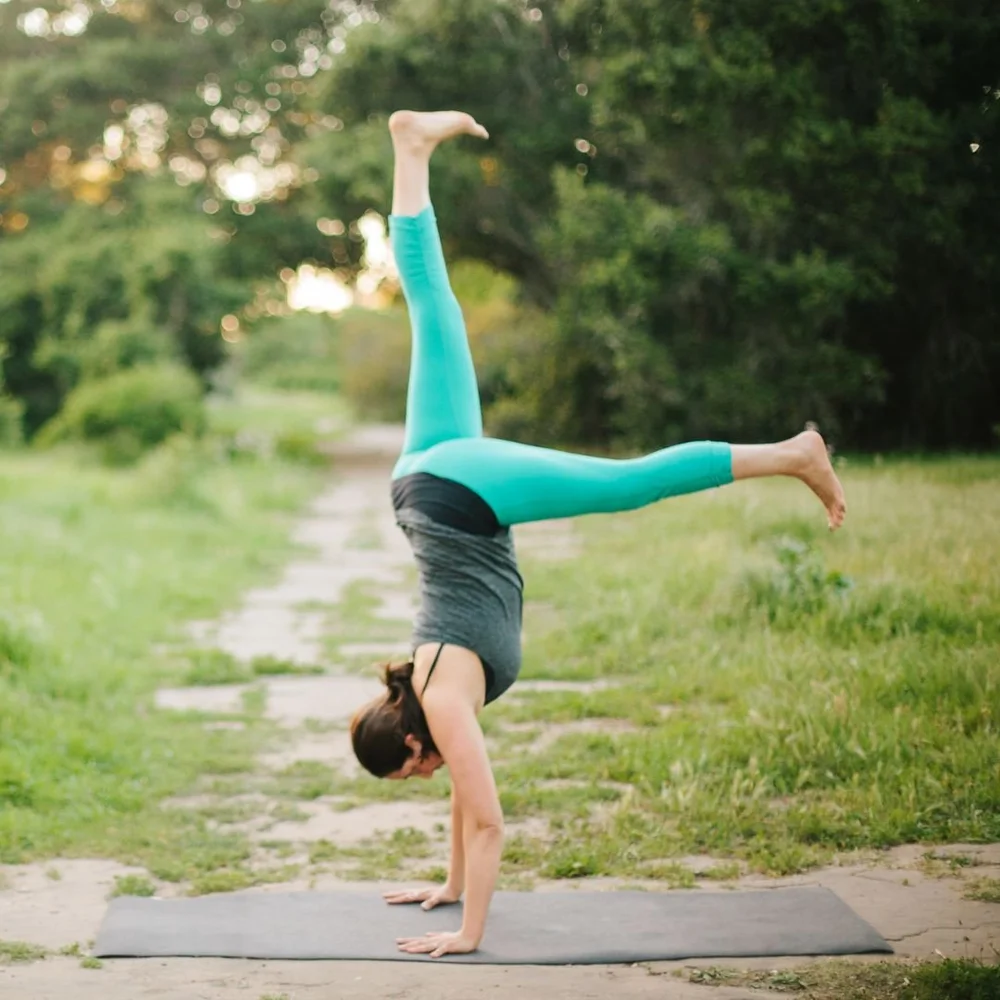This blog post was first sent to Jenni’s email list as an email newsletter. Sign up for the JRY email newsletter here!

I’ve been taught many times that a strong core is the key to handstand. Have you heard messaging like this, too?
The idea is usually that in order to practice handstand well, we need to make strengthening the core our top priority.
I question this line of thinking, though. While the core definitely plays a role in handstand (adho mukha vrksasana), I don’t think it’s the top priority or “the key” to this challenging pose.
[Disclaimer: in this post, I’m really just addressing the topic of strength for handstand. There are other important elements too, such as skill with the movement, proprioception, practice over time, etc. This post focuses on the element of strength! 💪]
Handstand is a pose that really requires full body tension/engagement. So in that sense, the core *is* certainly working here.
But is it working significantly *more* than all other areas? 🤔
If we look at handstand biomechanically, we can actually see that the core (i.e., the anterior core/abdominals) is not working against much resistance in this position because our torso is pretty much vertical in relation to gravity.

On the other hand, the area of our body that does have to work against a lot of resistance in handstand is actually… our *shoulders*!
Just think about it: if our shoulders/upper body suddenly stopped working in handstand, we’d collapse down to the floor.
In order to prevent that, we must push the floor away through our arms.
In other words, we use our vertical shoulder pushing strength in order to hold ourselves up in handstand!
So shoulder strength is what *I* see as the top priority to work on for handstand (in terms of strength).
But here’s how the core is important in handstand!
Upper body strength may be the true “key” to handstand in terms of strength, but the core does still play a role in this inversion!

You probably know that it’s easy to move into an arch or a banana shape in handstand 🍌.
While “banana-ing” one’s handstand isn’t inherently bad or injurious, most people like to work toward a “straight line” shape instead.
To resist moving into that tempting banana shape and maintain a straighter line instead, our core does need to work!
So there’s a certain amount of baseline core strength we must possess in order to embody the handstand line that our eyes often like to see.
And working on targeted core strength moves are definitely helpful in this department.
(Interested in improving your core strength to help you better embody handstand? Grab my 5-week core program – it’ll do the job!)
One final note about handstand. While I don’t think targeted core strengthening is the essential key for regular, general handstand, when it comes to the handstand press, that’s a different story!
In a handstand press, one folds forward into uttanasana (standing forward fold), places their palms on the floor, and floats their feet up off the floor and their legs up into handstand. There’s no momentum or kicking/jumping up involved – it’s all a single controlled movement.
In this handstand press transition, core strength actually plays a major role! A strong core is required in this move – particularly in that compact forward fold position, in which you first float your feet off the floor.
Therefore, for the handstand press specifically, we could actually consider core strength to be a key factor!
As you can see, the role of core strength in handstand is quite the nuanced topic! 😛
Core strength might not be “the key” to this pose (unless we’re talking about the handstand press specifically), but a baseline level of core strength is still helpful in this inversion!
Want to build core strength to support your handstand – and everything else??
Order my 5-week core strength program!
Created by an exercise science professor (Travis Pollen) and a long-time yoga teacher (me), this is not a “shredded abs” program 😉 – it’s a 360° core-targeted program to build strength and confidence in this key region of the body!



